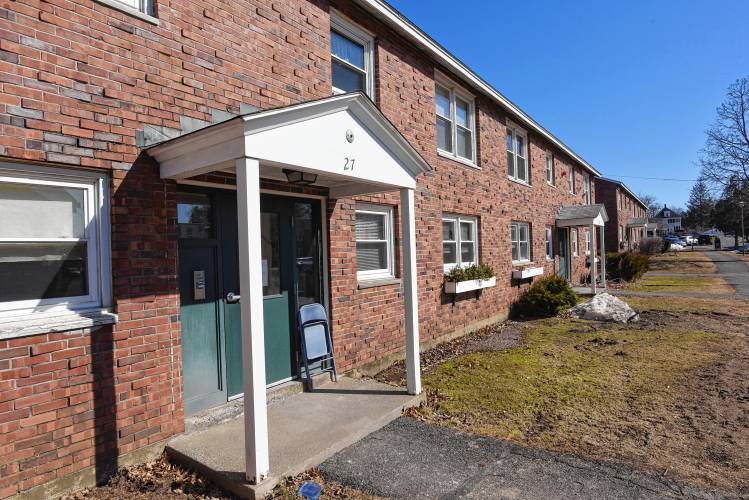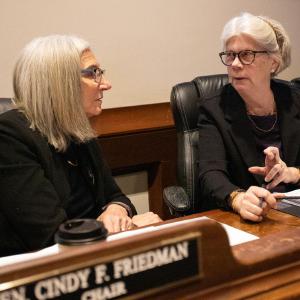Guest columnists Ellen Attaliades and Lynn Ireland: Housing crisis is fueling the human services crisis

Elm Terrace housing in Greenfield. STAFF FILE PHOTO/PAUL FRANZ
| Published: 04-24-2024 4:43 PM |
Vacancies at programs operated by human services providers — despite some progress over the last two years — are still much too high. More than one in four direct support professional positions in adult residential and day programs for people with intellectual and developmental disabilities (I/DD), or about 5,000 positions, are unfilled in Massachusetts.
Direct support work is very demanding as it involves caring for individuals with disabilities, many of whom also have complex medical and behavioral needs, to support them in their daily lives. The current hourly median wage for staff working in residential programs is reimbursed by the state at less than $17 an hour, although it is scheduled to rise to $20, or $41,600 annually, this year. This is not yet a living wage. The salary is 133%, or just one-third higher, than the federal poverty level for a family of four.
The human services crisis, marked by high vacancy rates that limit capacity for people who need these services, is inexorably linked with the housing crisis, which is causing people to leave Massachusetts every day because the state is simply no longer affordable. The people who work in our programs must work two and three jobs to pay the most essential bills, including rent. And homeownership? That is out of the question for many.
For example, “Alice” is a single mother with two young children who works full time in our day program. She reports living in a neighborhood where the sounds of gunshots and drug dealers on the corner are not out of the ordinary. It is unsafe for her children to be outside at any hour. Alice loves her job and working with clients, particularly watching them progress. She learns as much from them as they do from her.
After work in the day program Alice picks up her children from school, brings them home, makes dinner, and then helps with homework and the bedtime routine. Three days a week, Alice has her elderly mother take care of her children so she can work as a waitress. It is the only way she can make ends meet.
Alice and many more like her are the reason our industry is committing itself to working toward the solution of the state’s housing crisis, along with the human services workforce crisis. If we can solve the former, we will take a leap forward in addressing the latter.
The passage of the Healey-Driscoll administration’s Affordable Homes Act (H. 4138) would provide critical resources for addressing the housing issues contributing to our workforce crisis. This legislation, which includes more than $4 billion in grants and funding for improved local infrastructure as well as improvements to public housing stock, will help.
Article continues after...
Yesterday's Most Read Articles
 1989 homicide victim found in Warwick ID’d through genetic testing, but some mysteries remain
1989 homicide victim found in Warwick ID’d through genetic testing, but some mysteries remain
 Sportsman’s Corner: Orange Gun Club’s Kids Derby
Sportsman’s Corner: Orange Gun Club’s Kids Derby
 Orange Selectboard declares armory as surplus property
Orange Selectboard declares armory as surplus property
 Providers, families seek legislative urgency to support ALS treatment
Providers, families seek legislative urgency to support ALS treatment
 Battery storage bylaw passes in Wendell
Battery storage bylaw passes in Wendell
 Upon review, panel not behind any ballot questions
Upon review, panel not behind any ballot questions
Here is how:
First, the 40,000 new homes estimated to be created by the law will make housing available to many people, including some of our staff who are shut out from it, and will ultimately lower the cost of housing.
Second, allowing Accessory Dwelling Units (ADUs), sometimes referred to as in-law apartments, by right in all communities is another step forward. The administration estimates that up to 10,000 ADUs could be created through this change. These could benefit lower-wage employees, such as direct service providers, who often are just starting out in their careers. Women, people of color and those born in another country make up a large portion of this workforce.
It is also important to consider promising models being implemented in some areas of the state, like the Housing Assistance Corp.’s THRIVE initiative (Tools to Help Residents In a Vulnerable Economy) on Cape Cod, and study the viability of scaling them up. THRIVE provides housing vouchers, paid directly to landlords, and is specifically targeted to human service professionals supporting individuals with I/DD, and to child care workers.
When our staff has access to housing that is affordable, more people will enter and stay in the profession, and we must use all the resources available to make this happen.
Let’s start with passage of the Affordable Homes Act.
Ellen Attaliades is president and CEO of the Association of Developmental Disabilities Providers. Lynn Ireland is president and CEO of Riverside Industries in Easthampton.

